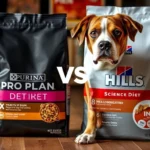
Proper nutrition is critical for puppies, especially for energetic breeds like Pit Bulls. As a breed known for their strength and stamina, Pit Bull puppies have unique dietary needs that set them apart from other dog breeds. Understanding these needs is essential for ensuring they grow into healthy, happy adults. This guide will help you navigate the landscape of puppy food options to find the best puppy foods for Pit Bulls.
Understanding the Nutritional Needs of Pit Bull Puppies
Growth and Development
Pit Bull puppies grow rapidly during their first year, reaching their full size between 12 to 18 months. This growth phase requires a balanced diet rich in essential nutrients to support healthy muscle and bone development. The right nutrition plays a crucial role in preventing growth-related issues, which can be common in larger breeds.
Key Nutrients Required
To thrive, Pit Bull puppies require a balanced intake of several key nutrients:
- Proteins: Vital for muscle growth and repair, proteins should make up a significant portion of a Pit Bull puppy’s diet. Look for high-quality protein sources like chicken, beef, or fish.
- Fats: Healthy fats are important for energy and contribute to a shiny coat and healthy skin. Omega-3 and Omega-6 fatty acids are particularly beneficial.
- Carbohydrates: These provide necessary energy and aid in digestive health. Whole grains and vegetables are excellent choices.
- Vitamins and Minerals: Essential for immune function and overall health, ensure the diet includes a variety of vitamins and minerals, such as calcium and phosphorus for strong bones.
Factors to Consider When Choosing Puppy Food
Age and Weight
Puppy diets should be tailored to their age and expected adult weight. Younger puppies require more calories and nutrients than older ones. When selecting food, consider the manufacturer’s guidelines based on your puppy’s age and weight to ensure they receive adequate nutrition.
Activity Level
The activity level of your Pit Bull puppy significantly influences their nutritional needs. Active puppies who engage in regular play and exercise will require more calories and protein than those who lead a more sedentary lifestyle. Adjusting food choices based on their activity level can help maintain a healthy weight and energy balance.
Allergies and Sensitivities
Pit Bulls can be prone to food allergies and sensitivities, often manifesting as skin issues or digestive upset. Common allergens include grains, chicken, and beef. If you suspect your puppy has a food sensitivity, look for hypoallergenic options or limited-ingredient diets. Always consult with a veterinarian if you notice any concerning symptoms.
Types of Puppy Food Available
Dry Kibble
Dry kibble is a popular choice due to its convenience and dental health benefits. It is less likely to spoil and can help reduce plaque buildup on teeth. When choosing kibble, look for high-quality brands with meat as the first ingredient, minimal fillers, and a balanced nutritional profile.
Wet Food
Wet food offers hydration and can be more palatable for picky eaters. It can be especially useful for puppies who need encouragement to eat. However, it is often more expensive and may lead to dental issues if fed exclusively. A combination of wet and dry food can provide a balanced diet while catering to your dog’s preferences.
Raw Diet
The raw food movement advocates for feeding dogs raw meat, bones, fruits, and vegetables. Proponents argue that it mirrors a dog’s ancestral diet and can lead to improved coat condition and energy levels. However, raw diets can pose risks, including bacterial contamination and nutritional imbalances. If considering a raw diet, consult with a veterinarian or a pet nutritionist for guidance.
Homemade Diets
Preparing homemade puppy food allows you to control ingredients and cater to your puppy’s specific needs. While it can be rewarding, it requires careful planning to ensure balanced nutrition. Essential nutrients should be included, and recipes should be formulated with guidance from a veterinary professional.
Top Brands and Products for Pit Bull Puppies
Brand Comparisons
Several brands stand out for their quality puppy food suitable for Pit Bulls. Here’s a brief overview of a few popular options:
- Blue Buffalo: Known for high-quality ingredients, Blue Buffalo offers a variety of recipes tailored for puppies, focusing on real meat and whole grains.
- Royal Canin: This brand provides breed-specific formulas that cater to the unique needs of Pit Bull puppies, emphasizing balanced nutrition.
- Wellness: Wellness offers a range of natural puppy foods with high protein content and wholesome ingredients, ideal for active Pit Bull puppies.
Recommended Products
Here’s a detailed list of the best puppy foods for Pit Bulls:
| Product Name | Pros | Cons |
|---|---|---|
| Blue Buffalo Life Protection | High-quality ingredients, grain-free options | Higher price point |
| Royal Canin Pit Bull Puppy | Breed-specific formula, balanced nutrition | Contains some fillers |
| Wellness CORE Puppy | High protein content, grain-free | Can be too rich for some puppies |
| Merrick Grain-Free Puppy | Real meat as the first ingredient, high energy | May cause digestive upset in sensitive pups |
| Nutro Ultra Puppy | Rich in antioxidants, multiple protein sources | Some puppies may prefer wet food |
These products have been favorably reviewed by both pet owners and experts for their nutritional profiles and overall quality.
Feeding Guidelines for Pit Bull Puppies
How Much to Feed
Feeding guidelines vary based on age, weight, and activity level. Generally, puppy food packaging provides recommendations based on weight. It’s important to measure food portions accurately to avoid overfeeding, which can lead to obesity and related health issues.
Feeding Schedule
Puppies should be fed several small meals throughout the day, typically three to four times, until they reach six months of age. After that, you can transition to two meals per day. Monitor their growth and adjust the feeding schedule as necessary.
Monitoring Health and Adjusting Diet
Regular veterinary check-ups are essential for monitoring your puppy’s growth and overall health. Your veterinarian can help you determine if any dietary adjustments are needed based on your puppy’s weight, activity level, and any health concerns.
Common Myths About Dog Nutrition
Grain-Free Diets
The grain-free diet trend has gained popularity, but recent studies have raised concerns about potential links to heart disease in dogs. While some dogs may benefit from grain-free diets, it’s crucial to consult with a veterinarian to determine the best approach for your Pit Bull puppy.
High Protein Diets
There’s a common belief that all dogs, especially active breeds like Pit Bulls, need a high protein diet. While protein is vital, excessive protein can lead to health issues. It’s essential to provide a balanced diet that meets the specific needs of your puppy rather than solely focusing on high protein content.
Conclusion
Choosing the best puppy foods for Pit Bulls is essential for their growth and long-term health. Understanding their unique nutritional needs and considering factors like age, weight, and activity level will guide you in making the right choices. Regular consultation with a veterinarian can provide personalized advice tailored to your puppy’s specific needs. Prioritizing proper nutrition today will set the foundation for a healthy and vibrant life for your Pit Bull puppy tomorrow.









